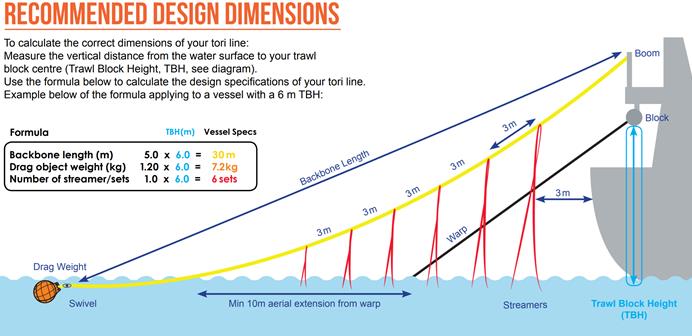The Undersecretariat for Fisheries and Aquaculture of the Government of Chile has proclaimed Resolution No. 2941 “Establish Management Measures to Reduce Incidental Catches of Seabirds in the Trawl Fisheries” of 28 August 2019 that makes adoption of defined seabird mitigation measures and good practices in trawling fisheries mandatory.
The resolution requires the adoption of management measures aimed at avoiding or minimizing the incidental catch of seabirds in various types of trawl fisheries carried out in waters under national jurisdiction or on the high seas by vessels flying the Chilean flag, through the mandatory use of equipment or devices and compliance with the best fishing practices set out in the resolution.
The required mitigation measures (in unofficial translation) include the deployment of twin bird-scaring lines (BSLs), at least 30 m long and with brightly coloured streamers (in certain fisheries and conditions bird bafflers may be used instead). In addition, nets must be cleaned before shooting. At night time the use or BSLs or Bird Bafflers may be dispensed with. A snatch block must be installed on the stern of the vessel to reduce the height of radiosonde cables when used. In certain defined trawl fisheries net binding is required to minimize the time the net is on the surface, by increasing it sink rate and diminishing the time of exposure when it can interact with seabirds. Discard management includes avoiding discarding during trawls and an overall reduction in the at-sea disposal of fish waste.

Bird-scaring line (BSL) design for Chilean trawlers - from Resolution No. 2941
Valeria Carvajal, Managing Director, Federation of Fishing Industries of the Austral Seas writes: “In our view, this resolution provides explicit measures which are in the line with ACAP's best practices and we are hopeful it could help to reduce even more the incidental mortality of seabirds in our fishing operations. The scientific observer programme carried out by IFOP (Instituto de Fomento Pesquero) together with the monitoring system through on-board cameras on all industrial vessels, will provide a broad observation of all fishing activity, including incidental mortality of seabirds.”
The new resolution follows on from Chile adopting its National Action Plan to Reduce Incidental Catches of Seabirds in Longline Fisheries (PAN-AM/Chile).
Read of an earlier initiative by the Association of Industrial Fisheries of Chile (Asociación de Industriales Pesqueros, ASIPES) along with BirdLife International’s Marine Programme (BIMP) to reduce seabird bycatch.
With thanks to Marcelo Garcia Alvarado, Subsecretaría de Pesca y Acuicultura (SUBPESCA) and Member for Chile, ACAP Advisory Committee, and Karin Mundnich, Unidad de Asuntos Internacionales, Subsecretaria de Pesca and ACAP National Contact for Chile.
Reference:
[Chile 2007]. Plan de Acción Nacional para Reducir la Capturas Incidentales de Aves en las Pesquerías de Palangre. 38 pp.
John Cooper, ACAP Information Officer, 18 September 2019

 English
English  Français
Français  Español
Español